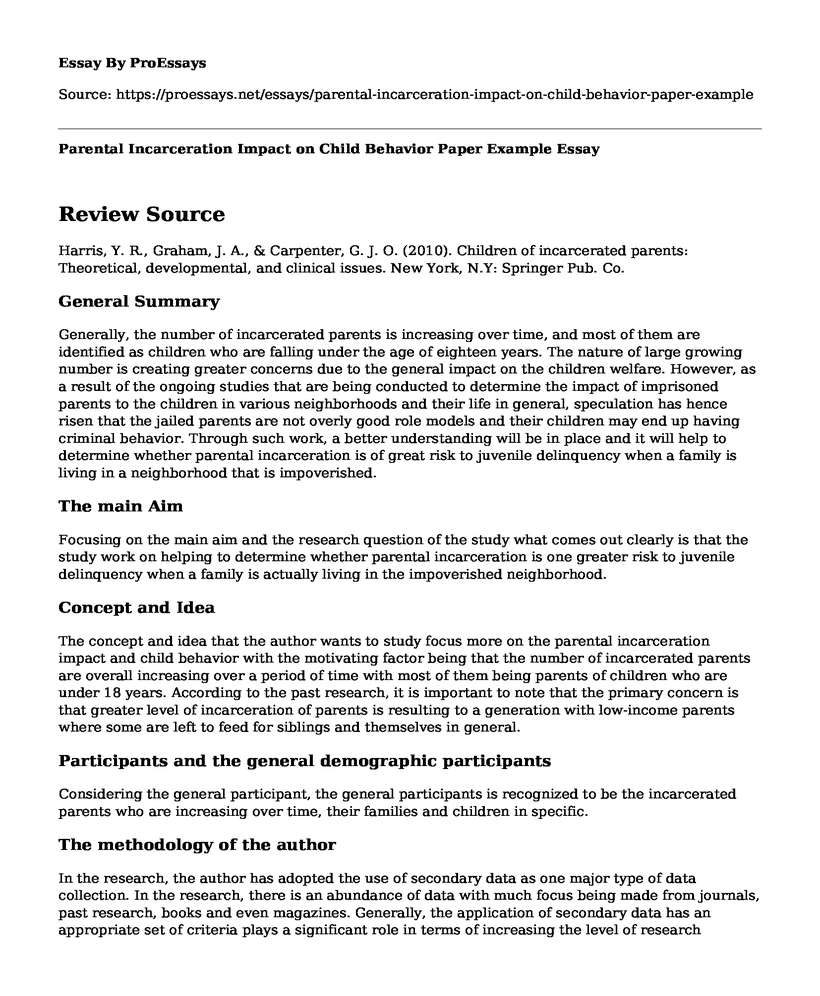Review Source
Harris, Y. R., Graham, J. A., & Carpenter, G. J. O. (2010). Children of incarcerated parents: Theoretical, developmental, and clinical issues. New York, N.Y: Springer Pub. Co.
General Summary
Generally, the number of incarcerated parents is increasing over time, and most of them are identified as children who are falling under the age of eighteen years. The nature of large growing number is creating greater concerns due to the general impact on the children welfare. However, as a result of the ongoing studies that are being conducted to determine the impact of imprisoned parents to the children in various neighborhoods and their life in general, speculation has hence risen that the jailed parents are not overly good role models and their children may end up having criminal behavior. Through such work, a better understanding will be in place and it will help to determine whether parental incarceration is of great risk to juvenile delinquency when a family is living in a neighborhood that is impoverished.
The main Aim
Focusing on the main aim and the research question of the study what comes out clearly is that the study work on helping to determine whether parental incarceration is one greater risk to juvenile delinquency when a family is actually living in the impoverished neighborhood.
Concept and Idea
The concept and idea that the author wants to study focus more on the parental incarceration impact and child behavior with the motivating factor being that the number of incarcerated parents are overall increasing over a period of time with most of them being parents of children who are under 18 years. According to the past research, it is important to note that the primary concern is that greater level of incarceration of parents is resulting to a generation with low-income parents where some are left to feed for siblings and themselves in general.
Participants and the general demographic participants
Considering the general participant, the general participants is recognized to be the incarcerated parents who are increasing over time, their families and children in specific.
The methodology of the author
In the research, the author has adopted the use of secondary data as one major type of data collection. In the research, there is an abundance of data with much focus being made from journals, past research, books and even magazines. Generally, the application of secondary data has an appropriate set of criteria plays a significant role in terms of increasing the level of research reliability and validity in general.
Analytical procedures used
Generally, the researcher has put in place comparative analysis in achieving the aim of the study. The analytical approach has altogether used to compare various studies on the effect of parental incarceration on the welfare of the children with a primary focus on the intergenerational transmission of criminality.
General findings and conclusion
The number of incarcerated parents is increasing over a period of time and most of them are identified as parents of children who are eighteen years of age. Notably, various intervention is being conducted and directed to families that have been facing parental incarceration that is put in place to assist responsible parenting initiative. Additionally, the greatest impact of financial loss makes children specifically in the poor areas to turn to crime.
Research gap
One major gap that is existing in this study is evidence that there exists no study that has been conducted so far that work on interviewing the children with incarcerated studies to assist in determining psychological and emotional impacts they have. On the other hand, the participant in the government has not been developed when it comes to the general improvement in improving the parent's lives.
Lesson Learnt
The society needs to take responsibility in providing a solution to children who have led to the imprisonment of children who led to their parents being imprisoned.
Reference
Harris, Y. R., Graham, J. A., & Carpenter, G. J. O. (2010). Children of incarcerated parents: Theoretical, developmental, and clinical issues. New York, N.Y: Springer Pub. Co.
Cite this page
Parental Incarceration Impact on Child Behavior Paper Example. (2022, Jun 17). Retrieved from https://proessays.net/essays/parental-incarceration-impact-on-child-behavior-paper-example
If you are the original author of this essay and no longer wish to have it published on the ProEssays website, please click below to request its removal:
- Community Service - Giving to the Community in Need
- Computers for Students With Special Needs Essay
- Bringing up a Boy Essay Example
- Essay Sample on Radical Psychiatry, Social Movements and 1968
- The Value of Critical Thinking as a Registered Nurse: Annotated Bibliography
- Article Analysis Essay on Community Mental Health Policy in America: Lessons Learned
- Low-Income Students Face College Application Data Deficit - Essay Sample







